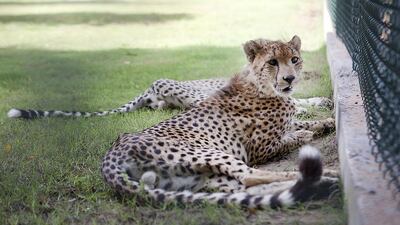SHARJAH // Owners of wild animals have welcomed a decision to set up specialised farms in Sharjah where they can house their pets in the emirate legally.
This week it was announced that owners of exotic wild animals could keep them at special preserves, available for rent through the Environment and Natural Reserves Authority.
The creation of the farms follows an emirate-wide ruling banning ownership of dangerous animals.
“Many owners of wild and dangerous animals in Sharjah stepped forward after the amnesty for offenders was announced,” said Hana Al Suwaidi, chairwoman of the Sharjah Environment Authority. “They affirmed their obedience to the law and expressed interest in rectifying the situation.
“It was commendable of them to respect the law they way they did,” she added. “They also expressed interest in keeping those animals.”
A few years ago a cheetah caused a scare in Sharjah when it was seen roaming the streets. It was eventually caught.
The farms will be behind Al Sajaa in an uninhabited area away from any industrial or commercial activities. They will be monitored by the Environment and Natural Reserves Authority and will be operated under strict conditions.
Mohammed Al Kumaiti, 37, bought a lion cub for Dh50,000 a few years ago from a farm in Dubai. An online video of his lion scaring others went viral.
Mr Al Kumaiti strongly supports the decision to outlaw wild animal ownership.
“I was one of the first people to own a lion as a pet before it become trendy to do so,” he said. “I liked him dearly but I know for a fact that these animals do not belong at a house or a domestic farm. As much as I loved him, there were three incidents when he almost took away my life if it wasn’t for the intervention of others.
“ Those are wild animals. You can’t change that fact,” Mr Al Kumaiti said.
He has since gone on safari in South Africa and was moved when he saw how lions behaved in their natural habitat.
“I felt foolish taking them out of their environment where they thrived. That is where they should have stayed.”
Bonnie Swesey, an animal rights activist who helped ban the pony rides in front of Marina Mall in Abu Dhabi, said: “Bringing in exotic animals is illegal and the law should be strongly enforced. Bringing in these animals is a danger to people as well as to the animals themselves. It’s much more rewarding to appreciate the animal in their natural habitat.”
The authority has not set a date for the completion of the farms, but said it would start allocating space for owners with a large number of predatory animals.
Sheikh Sultan bin Mohammed, Ruler of Sharjah, also issued a decree on the establishment of the Masnad Nature Reserve, which will also be run by the Environment and Protected Areas Authority.
The UAE is now a signatory to the Convention on International Trade in Endangered Species of Wild Fauna and Flora (CITES), which regulates the trading of more than 30,000 species. Animals and plants that fall under the convention can be imported or exported only with the relevant documentation.
nalremeithi@thenational.ae

